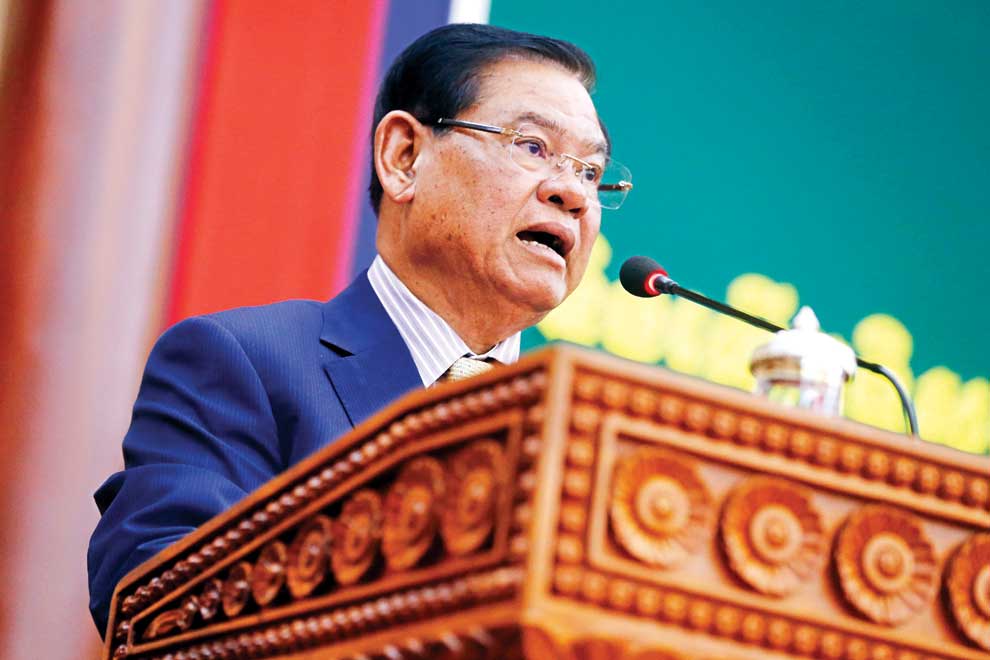
Civil society organisations are not regarded as opposition groups that intend to topple the current administration via a “colour revolution”, Interior Minister Sar Kheng said. Pha Lina
Minister of Interior Sar Kheng on Thursday said the government did not consider civil society organisations as being opposition groups which intended to overthrow the current administration via a “colour revolution”.
He said previous claims of the kind were merely the opinions of individual officials.
Briefly responding to journalists after speaking to more than 200 members of civil society groups, Sar Kheng said that he “100 per cent” supported moves to stop labelling NGOs as such, despite the Council of Ministers issuing a “white book” before the 2018 national elections accusing more than 300 civil society groups of participating in such a colour revolution.
Sar Kheng said that it was wrong for a government official to accuse an NGO of being involved in a colour revolution, but it was the individual official at fault and nothing to do with the government.
“The government does not accuse [in this way]. It might be that an individual NGO [implicated] themselves, so it’s their matter. But if their actions were contrary to the law and we took action, they would say we had labelled them and that is not right."
“I support any organisation [that’s] active in helping society and the nation, in any sector – whether advocacy or human rights – but if they comply with the law, who is going to label them otherwise? We must make this clear."
“Nobody has accused anyone, but if [an NGO] was involved [in such activity] then they must take responsibility before the law,” he stressed.
Sar Kheng said the Ministry of Interior had yet to receive any specific complaints from an NGO regarding such allegations, but if a civil society group had a complaint, then it should submit an official letter to the ministry outlining its grievance, and not simply raise it without evidence.
In the white book, the Council of Ministers said it considered some prominent non-governmental organisations, such as Adhoc, Licadho, Comfrel, and Nicfec, as being involved in a colour revolution.
‘Blacklist’
Nicfec executive director Sam Kuntheamy, who was not in the meeting, said that after his organisation was listed in the white book, all the activities by his team were restricted.
Kuntheamy said he wanted the government to put an end to such restrictions and make it easier for NGOs to perform their duties.
“Since Nicfec was named in the white book, I found it hard to do its work, and my team in the provinces resigned after seeing [us included in the document]."
“The claim spread to the sub-national level, so they resigned because they were concerned for their [safety]. We work professionally, but were still named on the blacklist.”
Sar Kheng, however, said no civil society organisation had been put on a blacklist by the Ministry of Interior.
Soeung Saroeun, the executive director of the Cooperation Committee for Cambodia, which represents more than 200 civil society organisations, said it was true that the Ministry of Interior had not labelled civil society groups in such a way, but other government institutions had.
“The [white book] was issued, and now it’s time to discuss whether we continue using it as a mechanism to label each other, or should it be removed from how we have worked in the past and we join together to find ways to develop the country,” he said.
As well as urging government officials to stop labelling NGOs as opposition groups, over 300 civil society organisations have agreed to ask the Ministry of Interior for 12 points to ensure their rights.
These include removing restrictions, including civil society into the ministry’s joint commission, and amending the Law on Assembly and Non-Governmental Organistaions.
Social analyst Ok Serei Sopheak said it was positive that Sar Kheng had spoken publicly about NGOs being labelled, saying it helped remove the public’s doubt.
He said some NGOs had misled the public through their activities. He cited an instance when some NGOs joined the 2017 Black Monday campaign, which the government deemed unlawful.
“Sar Kheng [was right to] point out that some NGOs do what they are not supposed to do. When [the NGOS] registered with the Ministry of Interior, they proclaimed they would do this and that."
“But in practice, they act against the terms and conditions … against their stated missions. That’s why Samdech Sar Kheng said its some NGOs that label themselves,” he said.









